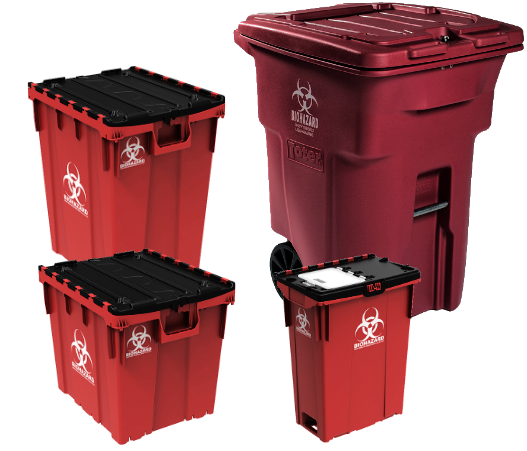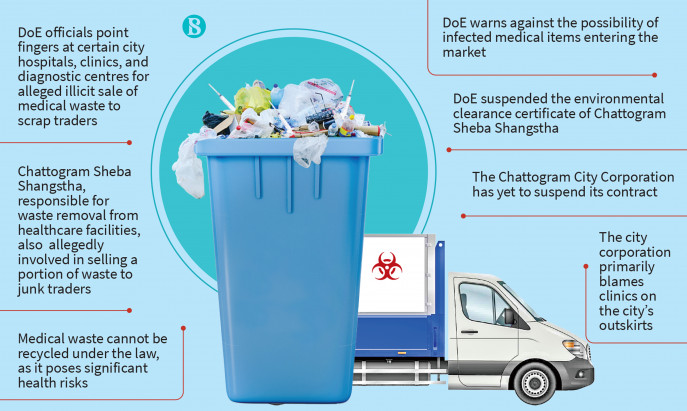Medical Waste Removal Proficiency: Where Service Excellence Fulfills Health And Wellness Criteria
Medical Waste Removal Proficiency: Where Service Excellence Fulfills Health And Wellness Criteria
Blog Article
The Importance of Appropriate Clinical Garbage Disposal: A Guide for Healthcare Facilities
Correct medical waste disposal is an important element of medical care center management, making sure the safety and health of people, team, and the environment. From understanding the various categories of medical waste to conforming with regulative needs, healthcare centers should take on effective waste partition techniques and choose ideal disposal methods.
Comprehending Medical Waste Categories
Comprehending medical waste categories is crucial for correct disposal in healthcare centers. Clinical waste is a broad term that encompasses various kinds of waste produced in healthcare setups, such as health centers, research laboratories, and facilities. Classifying clinical waste aids ensure that it is handled, kept, and disposed of safely and based on appropriate laws.
There are several groups of medical waste that medical care facilities need to be familiar with. These categories consist of infectious waste, sharps waste, pharmaceutical waste, chemical waste, and contaminated waste (medical waste disposal services with WasteX). Each category has particular characteristics and needs various disposal techniques to minimize the threat of harm to medical care employees, individuals, and the atmosphere
Contagious waste, for instance, describes throw away infected with possibly contagious materials, such as blood, body liquids, and cells. Sharps waste consists of needles, syringes, and other sharp objects that can cause injury or transfer infections. Pharmaceutical waste consists of expired or extra medications, while chemical waste is composed of unsafe chemicals utilized in medical procedures. Radioactive waste consists of materials contaminated with radioactive compounds, such as nuclear medication products.
Compliance With Regulatory Requirements
Medical care facilities should guarantee compliance with regulatory demands for proper clinical garbage disposal. Regulatory bodies, such as the Epa (EPA) and the Occupational Safety And Security and Health And Wellness Administration (OSHA), have developed guidelines and laws to guard public health and wellness and the atmosphere. These guidelines lay out the appropriate handling, storage, transportation, and disposal of clinical waste.
Conformity with regulative needs is vital for health care centers to stay clear of legal fines, reputational damage, and possible damage to human health and the setting. Failing to follow these guidelines can cause penalties, claims, and also the suspension or cancellation of running licenses.
To guarantee conformity, health care centers ought to develop comprehensive waste monitoring programs that consist of team training, correct waste partition, and making use of suitable containers and tags. Normal audits and inspections need to additionally be conducted to identify any type of non-compliance problems and resolve them immediately.
It is crucial for health care facilities to keep up to day with modifications in laws and update their waste administration techniques as necessary. This can be achieved by actively keeping an eye on updates from regulatory bodies and joining training programs and workshops.
Implementing Efficient Waste Segregation Practices
To make certain correct clinical waste disposal, medical care facilities need to execute reliable waste partition techniques. Waste partition is a crucial action in the general waste management procedure, as it aids minimize the threat of infection, protects against cross-contamination, and ensures the safe disposal of various kinds of waste. Efficient waste partition practices entail dividing clinical waste right into different categories based on its features and possible threats.
One typical method is the segregation of sharps waste, such as scalpels and needles, from various other kinds of medical waste. Sharps waste should be placed in puncture-resistant containers to stop injuries and prospective infections. Additionally, hazardous waste, such as chemicals and pharmaceuticals, need to be divided from general medical waste to avoid ecological contamination.
Proper labeling and color-coding of waste containers are vital for efficient waste segregation. Visible and clear labels need to be put on each container to show the sort of waste it includes and any type of unique handling needs - medical waste disposal services with WasteX. Additionally, color-coding can be utilized to set apart in between various waste classifications, making it easier for medical care team to dispose and recognize of waste correctly
Routine training and education for health care team is essential for the successful execution of waste partition practices. Team member need to be informed on the different waste categories, appropriate segregation techniques, and the importance of complying with waste administration protocols. This will help guarantee conformity and consistency in waste segregation techniques throughout the center.
Picking Appropriate Disposal Techniques
Proper selection of ideal disposal methods is important in ensuring the risk-free and environmentally liable monitoring of medical waste in medical care facilities. Healthcare centers generate a selection of medical waste, including sharps, transmittable waste, pharmaceutical waste, and chemical waste - medical waste removal. Each kind of waste needs details disposal techniques to minimize the risk of contamination, injury, and ecological harm
One common disposal method for medical waste is incineration. Incineration entails the controlled burning of waste at high temperature levels.

Chemical disinfection is another technique used for particular kinds of clinical waste, such as pharmaceutical waste. This approach uses chemicals to neutralize or ruin contaminants. However, it is important to choose chemicals that are ecologically friendly and secure.
Sometimes, land fill disposal may appropriate for non-hazardous clinical waste (medical waste disposal services with WasteX). Nevertheless, correct segregation and packaging are essential to prevent leakage or contamination.
Eventually, medical care centers should carefully assess the attributes of their medical waste and pick appropriate disposal methods that prioritize safety, click site environmental security, and governing conformity. Regular training and surveillance are important to guarantee that health care team adheres to appropriate disposal methods.

Training and Educating Team on Proper Disposal Procedures
Staff education and learning and training play an essential function in making sure the correct disposal of medical waste in health care facilities. It is important that all personnel, including medical professionals, nurses, technicians, and assistance staff, get extensive training on proper disposal treatments. This training must cover the different sorts of medical waste, their prospective risks, and the ideal methods for managing, segregating, and getting rid of them.
Among the primary objectives of personnel education and learning and training is to make certain that all medical care specialists comprehend the relevance of proper disposal treatments and the potential effects of incorrect waste management. They require to be familiar with the dangers associated with medical waste, such as the transmission of infections and the contamination of the setting. medical waste removal service. By recognizing these threats, personnel will certainly be much more inspired to comply with correct disposal methods and take the essential preventative measures to protect themselves, their associates, and the neighborhood
Educating ought to additionally cover the use of individual protective devices (PPE) and the correct strategies for managing medical waste. Personnel need to be enlightened on how to recognize and set apart different sorts of waste, such as sharps, infectious waste, and hazardous chemicals. They must also be educated on the correct use waste containers, such as sharps containers and biohazard bags, along with the significance of labeling and sealing these containers properly.
Furthermore, personnel education and training need to consist of normal updates and correspondence course to make sure that medical care specialists stay informed about the current guidelines and ideal techniques in clinical garbage disposal. This continuous education is important to maintain a high level of see page understanding and compliance amongst employee.
Verdict
In final thought, appropriate clinical waste disposal is of utmost value for medical care facilities. Understanding the various classifications of clinical waste and conforming with governing demands makes certain the safety and health of both healthcare employees and the basic public. Executing reliable waste partition practices and choosing appropriate disposal methods are crucial in protecting against the spread of infectious diseases and protecting the environment. Training and educating staff on proper disposal procedures is crucial for preserving a risk-free and tidy health care center.
From comprehending the different groups of clinical waste to conforming with regulatory demands, healthcare centers should adopt This Site reliable waste segregation practices and select appropriate disposal techniques. These categories consist of infectious waste, sharps waste, pharmaceutical waste, chemical waste, and radioactive waste.To make sure proper clinical waste disposal, medical care facilities must apply efficient waste segregation methods. Waste segregation is a critical action in the total waste administration process, as it aids minimize the risk of infection, protects against cross-contamination, and makes certain the safe disposal of various kinds of waste. Healthcare centers generate a variety of medical waste, including sharps, infectious waste, pharmaceutical waste, and chemical waste.
Report this page